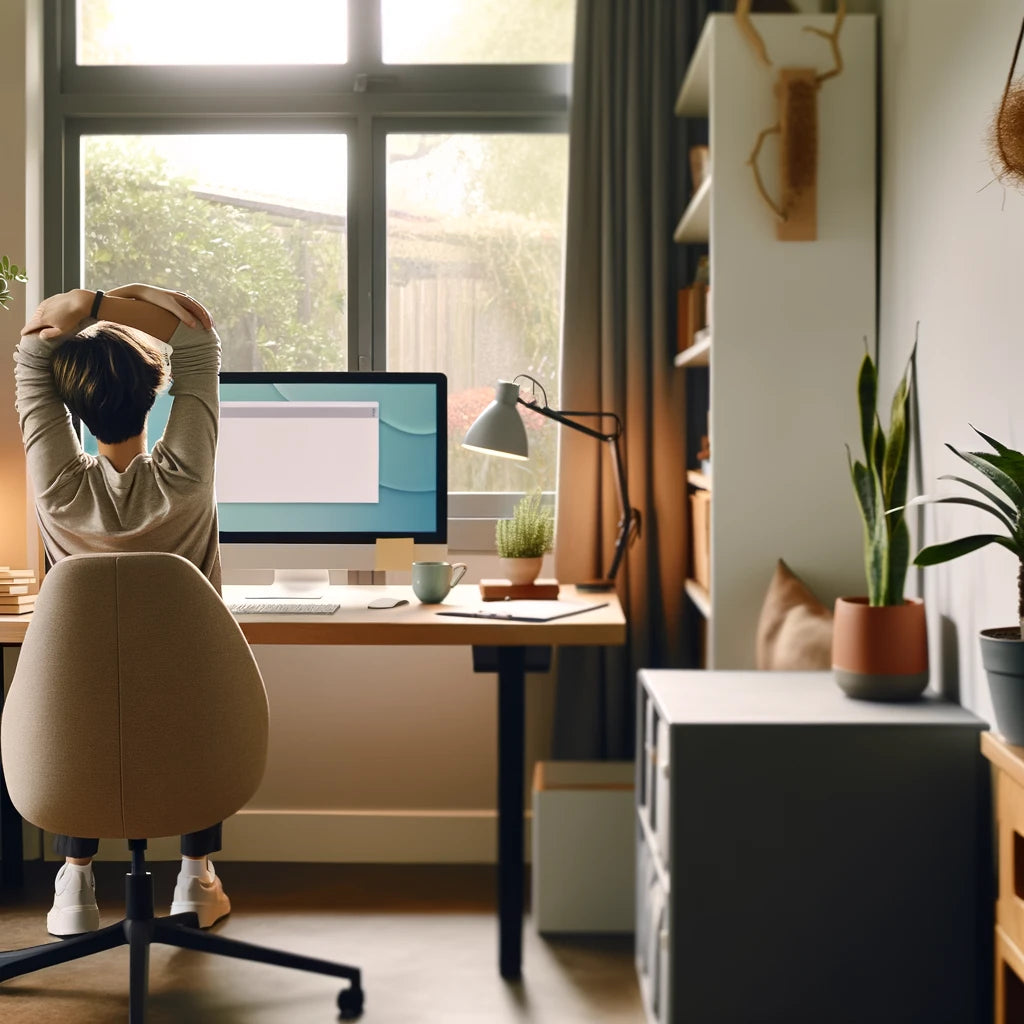Working from home has become a norm for many, bringing with it a unique set of challenges and opportunities. While the flexibility is appealing, it's crucial to find ways to balance work and self-care. Without a clear separation between professional and personal life, stress and burnout can easily creep in. This article delves into practical self-care tips to help you stay healthy, happy, and productive while working from home.
Creating a Dedicated Workspace
Establishing a dedicated workspace is the first step towards practicing self-care while working from home. A designated area helps create a mental boundary between work and leisure, allowing you to focus better and relax more completely once the workday is over. Choose a spot with good lighting and minimal distractions, and equip it with comfortable furniture to support good posture.
Setting a Routine
Maintaining a consistent daily routine can significantly impact your mental and physical well-being. Start your day at a regular time, incorporate breaks, and end your workday consistently. This structure can reduce stress and help manage work-life balance more effectively. Include time for meals, exercise, and relaxation in your schedule to ensure a holistic approach to self-care.
Taking Regular Breaks
Regular breaks are essential for maintaining productivity and mental clarity. Follow the Pomodoro Technique or set alarms to remind yourself to step away from your desk. Use these breaks to stretch, hydrate, or take a short walk. These small actions can prevent fatigue and improve overall well-being.
Staying Physically Active
Incorporate physical activity into your daily routine to counteract the sedentary nature of working from home. Exercise boosts endorphins, reduces stress, and improves concentration. Whether it's a morning yoga session, a lunchtime walk, or an evening workout, find activities that you enjoy and can consistently integrate into your schedule.
Eating Healthily
Nutrition plays a crucial role in self-care. Plan balanced meals and snacks that nourish your body and mind. Avoid excessive caffeine and sugary snacks that can lead to energy crashes. Instead, opt for whole foods like fruits, vegetables, lean proteins, and whole grains to maintain steady energy levels throughout the day.
Maintaining Social Connections
Working from home can be isolating, but maintaining social connections is vital for emotional well-being. Schedule virtual coffee breaks, video calls with friends and family, and participate in online communities or professional networks. These interactions can provide a sense of normalcy and support.
Practicing Mindfulness and Meditation
Incorporating mindfulness and meditation into your routine can help manage stress and enhance focus. Start or end your day with a few minutes of deep breathing or guided meditation. Mindfulness practices can ground you, reduce anxiety, and improve your overall mental health.
Setting Boundaries
One of the most challenging aspects of working from home is setting boundaries between work and personal life. Clearly define your work hours and communicate them to your household and colleagues. Turn off work notifications after hours and create a ritual to signal the end of the workday, like shutting down your computer or changing into comfortable clothes.
Personalizing Your Workspace
Personalizing your workspace with items that bring you joy can boost your mood and productivity. Add plants, artwork, or photos that inspire you. A pleasant and motivating environment can make a significant difference in your overall well-being.
Incorporating Self-Care Rituals
Incorporate small self-care rituals into your daily routine to enhance your well-being. This could be anything from a morning skincare routine, a cup of herbal tea in the afternoon, or a relaxing bath in the evening. These rituals can provide a sense of comfort and normalcy.
Managing Stress
It's essential to develop effective strategies for managing stress while working from home. Identify your stressors and address them proactively. Techniques such as deep breathing, progressive muscle relaxation, and journaling can help manage stress levels.
Getting Enough Sleep
Quality sleep is a cornerstone of good health. Establish a bedtime routine that promotes relaxation and ensures you get enough rest. Avoid screens before bed, create a comfortable sleeping environment, and aim for 7-9 hours of sleep each night.
Limiting Screen Time
Excessive screen time can lead to eye strain, headaches, and decreased productivity. Follow the 20-20-20 rule: every 20 minutes, look at something 20 feet away for at least 20 seconds. Incorporate non-screen activities into your breaks, such as reading a book or going for a walk.
Exploring New Hobbies
Use the flexibility of working from home to explore new hobbies or revive old ones. Engaging in creative activities like painting, cooking, or gardening can provide a fulfilling break from work and enhance your overall well-being.
Seeking Professional Help When Needed
If you find yourself struggling with stress, anxiety, or depression, seek professional help. Virtual therapy and counseling services are widely available and can provide the support you need to navigate challenging times.
Practicing Gratitude
Incorporate gratitude practices into your daily routine. Reflect on positive aspects of your day and express gratitude for them. This practice can shift your focus from stressors to the positives, improving your overall mindset and well-being.
Staying Organized
An organized workspace and schedule can significantly reduce stress. Keep your workspace tidy, create to-do lists, and prioritize tasks. Use tools like planners or digital apps to stay on top of your responsibilities and deadlines.
Balancing Work and Personal Life
Achieving a balance between work and personal life is crucial for long-term well-being. Set realistic goals, delegate tasks when possible, and ensure you have time for personal activities and relaxation. Balance is key to preventing burnout and maintaining productivity.
Connecting with Nature
Spending time in nature can have a calming and rejuvenating effect. If possible, take your breaks outside, go for walks, or work in a garden. Connecting with nature can reduce stress and improve your mood and creativity.
Practicing Positive Affirmations
Incorporate positive affirmations into
your daily routine to boost self-esteem and maintain a positive outlook. Start your day with affirmations that resonate with you, such as "I am capable and strong" or "I can handle whatever comes my way." These statements can help frame your mindset positively.
Establishing a Wind-Down Routine
Creating a wind-down routine at the end of your workday can help you transition from work mode to relaxation. This might include activities like a warm bath, reading a book, or listening to soothing music. A consistent wind-down routine signals to your brain that it’s time to relax and unwind.
Utilizing Technology Mindfully
While technology is essential for remote work, it’s important to use it mindfully to avoid burnout. Set boundaries for work-related communications and take regular digital detoxes. Mindful use of technology ensures it serves you without overwhelming you.
Creating a Positive Work Environment
Foster a positive work environment by incorporating elements that promote well-being. This can include ergonomic furniture, good lighting, and maintaining a clutter-free space. A positive work environment can enhance your productivity and overall sense of well-being.
Finding Work-Life Harmony
Instead of striving for a perfect balance, aim for work-life harmony. This approach acknowledges that some days work will take precedence and other days personal life will. Flexibility and self-compassion are key to finding harmony between work and personal life.
Leveraging Online Resources for Self-Care
Take advantage of online resources that offer self-care guidance, such as virtual yoga classes, meditation apps, and wellness webinars. These resources can provide support and ideas to enhance your self-care routine.
Staying Hydrated
Hydration is often overlooked but crucial for maintaining energy and concentration levels. Keep a water bottle at your desk and set reminders to drink water throughout the day. Staying hydrated supports overall health and well-being.
Engaging in Self-Reflection
Regular self-reflection can help you stay connected to your goals and values. Set aside time each week to reflect on your accomplishments, challenges, and areas for improvement. Self-reflection can guide you towards a more fulfilling work-from-home experience.
Practicing Self-Compassion
Working from home comes with its unique challenges, and it’s important to practice self-compassion. Be kind to yourself, acknowledge your efforts, and give yourself grace on difficult days. Self-compassion can reduce stress and improve mental health.
Self-Care While Working from Home
Self-care while working from home is essential for maintaining both productivity and well-being. By creating a structured routine, taking regular breaks, and integrating physical activity into your day, you can ensure that you’re taking care of both your body and mind. Additionally, maintaining social connections and setting clear boundaries can help manage stress and prevent burnout. Remember, self-care is not a one-size-fits-all approach, and it’s important to find practices that work best for you.
FAQs
What are some quick self-care activities I can do during work breaks?
You can try stretching, taking a short walk, practicing deep breathing exercises, or enjoying a healthy snack. These activities can rejuvenate you and help maintain focus.
How can I separate my work life from my personal life when working from home?
Establish a dedicated workspace, set clear working hours, and create rituals to signify the start and end of your workday. Communicate your work schedule with household members to minimize interruptions.
Why is physical activity important while working from home?
Physical activity boosts energy, improves mood, and enhances concentration. It also counteracts the negative effects of prolonged sitting, which is common in remote work settings.
How can I stay socially connected while working from home?
Schedule virtual meetups with friends and colleagues, participate in online communities, and make an effort to maintain regular communication with your social circle.
What should I do if I feel overwhelmed or stressed while working from home?
Take a break, practice mindfulness or meditation, engage in physical activity, or reach out to a trusted friend or professional for support. Managing stress is crucial for maintaining overall well-being.
How can I improve my workspace to enhance productivity and well-being?
Ensure your workspace is well-lit, ergonomically friendly, and free from clutter. Personalize it with items that inspire you and incorporate elements that promote relaxation and focus.
Conclusion
Practicing self-care while working from home is essential for maintaining a healthy work-life balance and ensuring long-term productivity and well-being. By implementing these strategies, you can create a supportive and nurturing work environment that promotes both professional success and personal happiness. Remember, self-care is a continuous journey, and it’s important to regularly assess and adjust your practices to meet your evolving needs.






